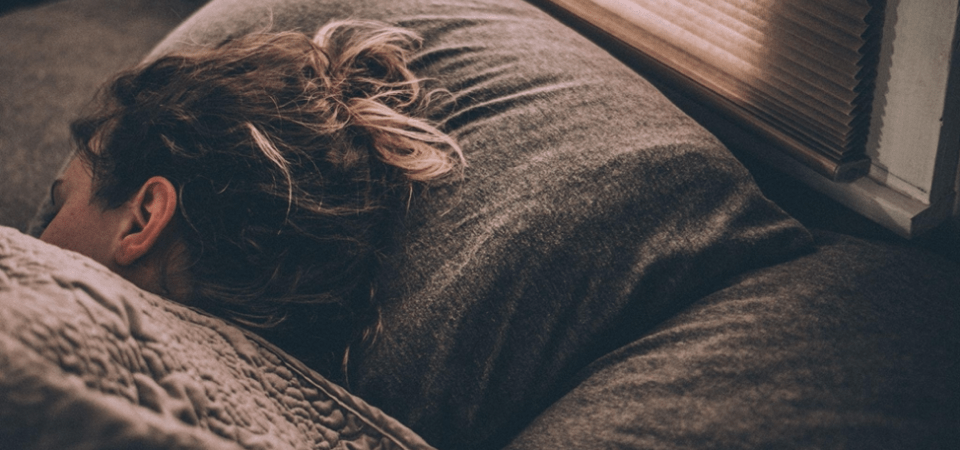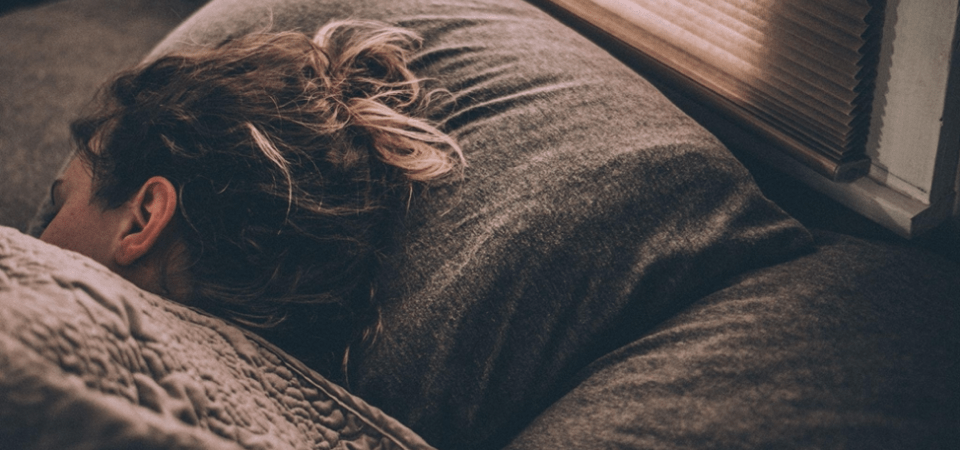
Self-care. It’s one of those concepts, like balance, that have become cringeworthy to men and women in the midst of their hectic lives. It’s apparently the thing that will save you from your overwhelm and burnout, according to the latest magazine articles and Instagram posts. But it only tends to result in a “must be nice” response.
Massages and bubble baths? A mani/pedi?
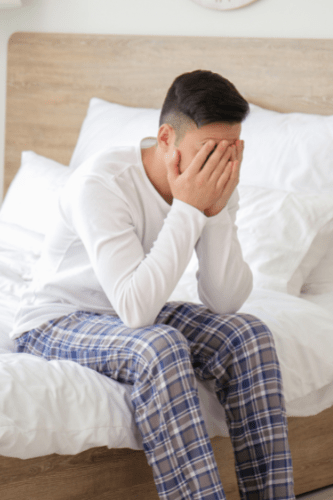
Must be nice. I’m preparing for yet another move. Who has time for that?
Yoga and meditation?
Must be nice. I have a million things going on in my head right now, and you just want me to breathe through it?
For men the message is to exercise, go out for a drink with friends, or get a massage.
Again. Who has time for that amidst work schedules, PCSing, and other challenges of military life?
Yet there is one overlooked aspect of self-care—true self-care, the taking care and nurturing of your innermost self, that if prioritized can have an immense impact on your health.
Oh, and did I mention that it’s free, but grossly underutilized?
It’s sleep, and according to The National Sleep Foundation, adults between the ages of 18 and 64 need seven to nine hours of it per night. Yet over thirty-five percent of Americans report sleeping less than seven hours per night.
The effects of sleep deprivation? Increased risk for a variety of health issues including cancer, Type 2 Diabetes, heart disease, dementia, anxiety, and depression. Not to mention brain fog and forgetfulness, which can make managing your home and families even more challenging.
MY WAKE-UP CALL ENDED UP BEING MORE SLEEP
I didn’t realize how much sleep deprivation was negatively affecting me until May of 2022, when my 4-year old son Sean, my husband, and I all got COVID within days of each other. Knowing that I was going to be quarantining with Sean for a few weeks, my husband asked me a question I hadn’t considered, “Why don’t you sleep in and just exercise with him?”
Sleep in? I was used to getting up at five a.m. and doing my workout before the kids woke up. I prided myself in this “me” time, uninterrupted by my boisterous boys. But now with hours of time stretching ahead of me, I figured I would give it a try once I felt up to exercising again.
The result of one month with an extra hour of sleep per night? Life-changing. For months I had been struggling with sensitivity to noise and touch, especially around the time before my menstrual cycle. Not only did it decrease considerably after I got more sleep, but I felt more calm, patient, and even happy. Could it be that simple? Had I just been sleep deprived all this time?
WHY WE DON’T SLEEP
I know what you’re about to do.
Must be nice. An extra hour of sleep a night? Do you have any idea what’s on my to-do list?
I don’t know your exact circumstances, but I do know that there are probably many “logical” reasons why you aren’t getting the sleep you need:
• You have young kids that are up through the night.
• You like having “me” time after work or after the kids go to bed, and that ends up being time on your phone that goes longer than you planned (Instagram and Netflix, perhaps?).
• You can’t shut off your brain and it takes a long time to fall asleep.
Regardless of the reasons, there are small tweaks that you can make to improve your chances of a good night’s sleep, otherwise known as sleep hygiene. Like flossing your teeth or drinking adequate water, they are simple things that can make a huge difference in your overall health.
FIVE SIMPLE BEDROOM HACKS TO IMPROVE YOUR SLEEP HYGIENE
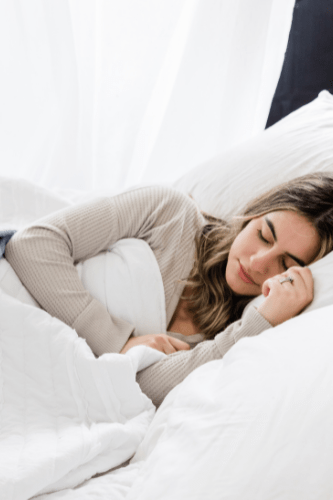
If your home is a refuge, your bedroom is a refuge within a refuge. But are you treating it that way? Before you can transform any room, you have to understand the purpose of it and make sure that you are designing the room (otherwise known as environment design) to reflect its purpose.
The main purposes of a bedroom may be:
• Sleeping
• Resting
• Spending time (intimate or otherwise) with your spouse or partner
• Getting dressed
Make a list of your top three priorities for your bedroom and look at these as you read through my five favorite hacks to help you design your environment for better sleep.
1. CLUTTER IN YOUR HOME IS STEALING YOUR PEACE, BUT ESPECIALLY IN YOUR BEDROOM
I educate women about the effects of clutter on their well-being, including increased stress and anxiety and reduced focus and working memory, among others. Men experience the same effects of a cluttered environment as well. But one of the main findings on clutter specifically deals with a cluttered bedroom.
Research presented at the 29th Annual Meeting of the Associated Professional Sleep Societies LLC in 2015 found that those who are at risk for hoarding disorder, including people with extremely cluttered or unusable bedrooms, have higher risk of sleep disturbances and low sleep quality. A 2017 study found that decluttering the bedroom improved sleep quality among women who did not have hoarding disorder.
Also, research suggests that having more objects in your visual field (such as clutter within a space in your home) can make it difficult for your brain to focus, due to the fact that the stimuli are competing for representation in the visual cortex. By using functional magnetic resonance imaging (fMRI), a 2011 study confirmed that multiple visual stimuli negatively impacted the subjects’ ability to focus on a specific task.
As you look around your bedroom and look at each item, ask yourself, “Does this add or detract from the purpose of this room?” That includes screens, clutter, and anything within your visual field that may be distracting you.
2. DEVELOP A BEDTIME ROUTINE AND KEEP THE SAME WAKE-UP TIME REGARDLESS OF THE DAY OF THE WEEK

My husband and I have always kept consistent bedtime routines for our boys since they were babies, so much so that now if we miss a step they are the first to tell us about it. But adults rarely give the same care and attention to a consistent bedtime routine every night.
The purpose of a bedtime routine, however, is the same for adults as children—it cues your minds and bodies that it is time for sleep. Starting your wind-down and bedtime routines around the same time every night is a great first step. There is strong evidence, however, to suggest that a consistent wake-up time, regardless of the day of the week, is hugely beneficial to your quality of sleep by supporting your circadian rhythms.
3. PICK A WIND-DOWN TIME EACH EVENING AND REDUCE (OR ELIMINATE) THE LIGHT YOU ARE EXPOSED TO AT THAT TIME
Choose what time you’d like to have “lights out,” and build in thirty to sixty minutes for winding down. Please note: winding down does NOT mean looking at a screen. Blue light emitted from screens can interfere with your ability to fall asleep and your circadian rhythms.
If you feel like you absolutely must look at your devices during that time, consider changing the color filters to red (I have made this a shortcut on my iPhone for this purpose) or utilizing blue light glasses. You may also want to consider switching out your bedroom light bulbs to color-changing LED ones. We use the red light setting about fifteen minutes before bed and it has been very helpful!
Finally, consider blackout shades. We have them in our bedroom, as well as in our kids’ rooms. Light can hinder the production of melatonin, so keep the room as dark as you’re willing! My husband has gone so far as to cover up the lights from chargers in our room with electrical tape. If you’re worried you’re going to bump into something in the night, consider a red light nightlight in the bathroom.
4. CREATE YOUR “SLEEP TOOLKIT” AND KEEP IT IN YOUR NIGHTSTAND TO HAVE CONSISTENCY NO MATTER WHERE YOU ARE IN THE WORLD
Although you may have lived in too many places to count, you can create a feeling of consistency and predictability by having the same “sleep toolkit” items no matter where you are. This could include lavender essential oil spray, your favorite sheets and pillowcases, the remote for the red light bulbs, the book you’re currently reading, earplugs, headphones to meditate before bed—whatever helps you the most.
5. MAKE YOUR BED IN THE MORNING SO YOU CAN UNMAKE IT IN THE EVENING
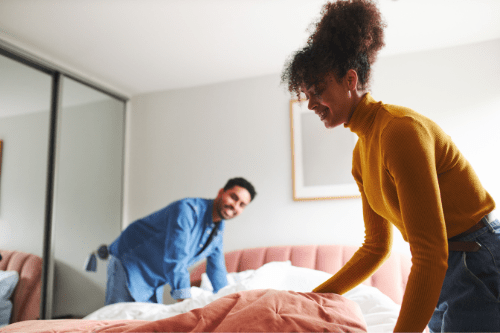
This may be a strange tip since it’s not really about sleep, but it’s about making your bedroom a peaceful haven. The book Make Your Bed by Navy Seal Admiral William McRaven is all about this idea. As McRaven says, “If you make your bed every morning, you will have accomplished the first task of the day. It will give you a small sense of pride and it will encourage you to do another task and another and another…Making your bed will also reinforce the fact that little things in life matter. If you can’t do the little things right, you will never do the big things right…If you want to change the world, start off by making your bed.”
When you are ready to wind down for the day, a bed that’s been made can remind you of the little things that have gone right, so that you can unmake your bed and prepare for sleep with the same gratitude.
Which ones will you try? By making small tweaks and introducing more consistency into your evenings, you can help promote the sleep that you so desperately need. Sleep is the unsung hero of wellness, and it’s time you give it the respect that it deserves. Sweet dreams!
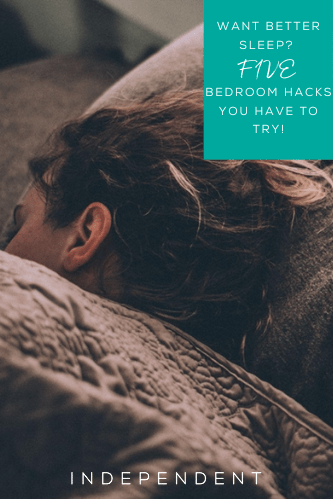
ABOUT EMILY

Emily McDermott is an Air Force wife and mom to two boys living in Fairfax, Virginia. Her blog Simple by Emmy chronicles her journey to a simpler and more intentional life. Emily helps moms of young children understand their deepest “why,” banish decision fatigue, and make room for what matters most in her online course Moms Overcoming Overwhelm. She is also the author of the children’s book Little One and enjoys writing custom poetry, dancing, and eating peanut butter out of the jar.
